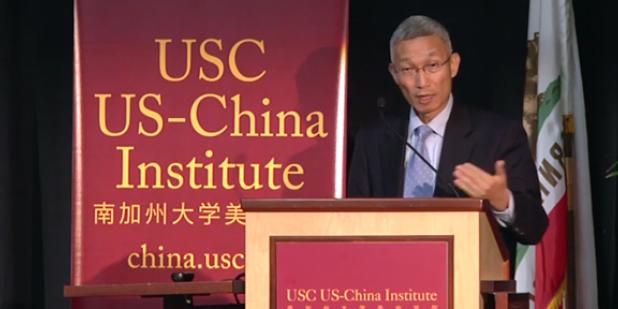Join us for a free one-day workshop for educators at the Japanese American National Museum, hosted by the USC U.S.-China Institute and the National Consortium for Teaching about Asia. This workshop will include a guided tour of the beloved exhibition Common Ground: The Heart of Community, slated to close permanently in January 2025. Following the tour, learn strategies for engaging students in the primary source artifacts, images, and documents found in JANM’s vast collection and discover classroom-ready resources to support teaching and learning about the Japanese American experience.
Minxin Pei - Discussant for Panel 1: Security/Regional Disputes
Minxin Pei discussed the first panel of the conference Through Tinted Lenses? How Chinese and Americans See Each Other, hosted by the USC U.S.-China Institute.

About the Speaker
Minxin Pei is Tom and Margot Pritzker '72 Professor of Government and directs the Keck Center for International and Strategic Studies at Claremont McKenna College. A frequent contributor to the nation's op-ed pages and the author of many journal articles, Pei is also known for his books From Reform to Revolution: The Demise of Communism in China and the Soviet Union and China's Trapped Transition: The Limits of Developmental Autocracy. Before moving to Claremont McKenna, Pei headed the China program at the Carnegie Endowment for International Peace.
This video is also available on the USCI YouTube Channel.
Through Tinted Lenses? How Chinese and Americans See Each Other
What do Americans and Chinese "know" about each other and how do they know it? What images do they have of each other's society and state? Where do these images come from? Why do some endure and others change? How do images vary with age and other factors? How do these perceptions affect the decisions and actions of governments, businesses, civic groups, and individuals?
On November 1-2, 2013, leading academics gathered with pollsters, journalists, diplomats, and entertainment industry practitioners to explore these questions and questions and others at a conference hosted by the USC U.S.-China Institute.
Polls suggest that a slight majority of Americans believe that the values of Chinese and Americans are so different that cooperation to address international problems is impossible. Most Chinese feel the U.S. is working to constrain China's continued rise. Americans and Chinese have increasingly negative impressions of each other's countries. Yet, we are visiting each other's countries more than ever before, becoming ever more intertwined, and are working cooperatively in many different ways to address pressing social, economic, and environmental issues. At the conference we examined how these exchanges affect perceptions along with the even more powerful role played by new and old media, popular entertainment, and political discourse.
Featured Articles
Please join us for the Grad Mixer! Hosted by USC Annenberg Office of International Affairs, Enjoy food, drink and conversation with fellow students across USC Annenberg. Graduate students from any field are welcome to join, so it is a great opportunity to meet fellow students with IR/foreign policy-related research topics and interests.
RSVP link: https://forms.gle/1zer188RE9dCS6Ho6
Events
Hosted by USC Annenberg Office of International Affairs, enjoy food, drink and conversation with fellow international students.
Join us for an in-person conversation on Thursday, November 7th at 4pm with author David M. Lampton as he discusses his new book, Living U.S.-China Relations: From Cold War to Cold War. The book examines the history of U.S.-China relations across eight U.S. presidential administrations.




